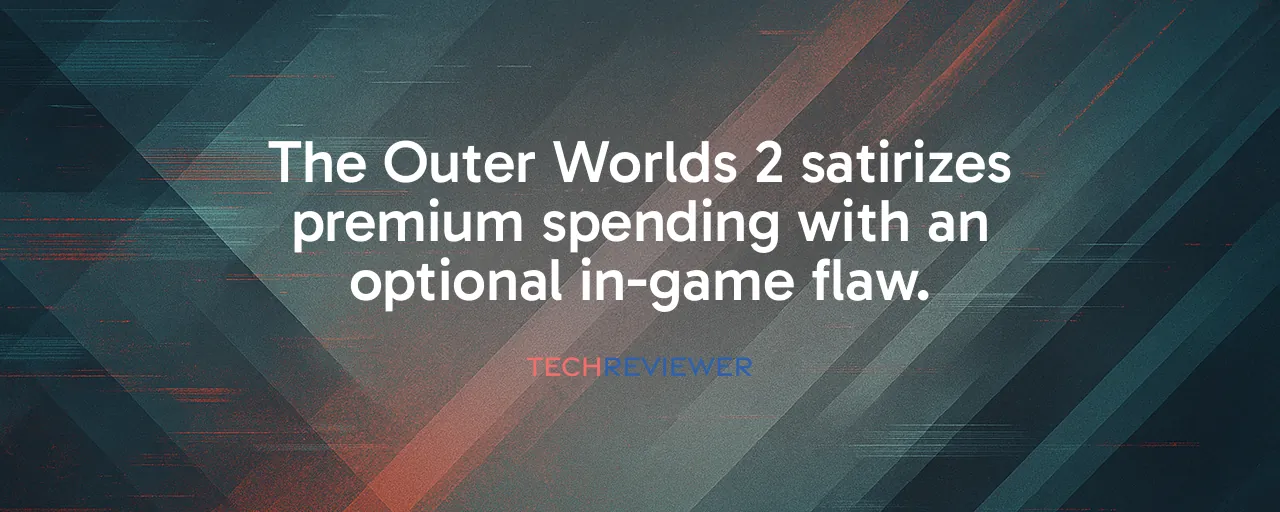A Playful Jab at Players
When players shelled out $99.99 for The Outer Worlds 2's Premium Edition, they expected early access and exclusive perks. What they got instead caught them off guard: a satirical in-game flaw called Consumerism that pokes fun at their spending. Available in early access on October 24, 2025, for Premium Edition purchasers, Obsidian Entertainment's sequel leans into its anti-capitalist roots, using optional debuffs to deliver a clever critique of gaming's monetization habits. The Consumerism flaw, for instance, reduces prices by 15% when buying from vendors but cuts sell values by 10%, a cheeky nod to players' willingness to pay for premium content.
This isn't Obsidian's first rodeo with satire. The original Outer Worlds in 2019 skewered corporate greed, and the sequel doubles down with a refined flaw system that tracks player behavior. Other debuffs, like Foot-in-Mouth Syndrome for skipping dialogue or Easily Distracted for scattered skill points, tie mechanics to narrative wit. Players on Reddit and social media have embraced the humor, sharing screenshots and praising Obsidian's self-aware jab as a refreshing take in a sea of serious RPGs.
Balancing Humor With Gameplay
Obsidian's developers designed the flaw system to enhance player agency, not restrict it. Every flaw is optional, letting players decide whether to accept the Consumerism debuff or skip it entirely. Accepting it adds depth to role-playing, as the permanent choice shapes the campaign's 30-plus-hour journey. The system tracks behaviors like dialogue choices or skill point allocation, offering flaws that feel personal to each playthrough, creating emergent storytelling moments.
The approach pays off mechanically too. The Consumerism flaw's discount outweighs its penalty, making it a net-positive for players who lean into purchasing in-game items. This balance ensures the satire doesn't alienate players who prefer straightforward progression. Reviewers from IGN and PC Gamer have praised the system's depth in The Outer Worlds 2, released on PC, Xbox Series X/S, and PlayStation 5.
Lessons From Gaming's Satirical Past
Obsidian's approach draws inspiration from games like The Stanley Parable, which used meta-commentary to poke fun at player choice in 2013. That game's narrator mocked players for ignoring instructions, creating a humorous dialogue between game and gamer. Similarly, The Outer Worlds 2 uses its flaws to comment on the industry's premium edition trend, where 15% of Steam games now use early access models, per Empirical Software Engineering. Obsidian's satire lands because it's optional and thematically consistent with the franchise's critique of unchecked capitalism.
Contrast this with Deus Ex: Mankind Divided in 2016, where Square Enix faced backlash for a pre-order system that tied rewards to collective player purchases. The heavy-handed approach felt exploitative, alienating fans. Obsidian avoids this pitfall by keeping its satire light and player-driven, ensuring the humor enhances rather than overshadows the experience. The positive buzz on social platforms and coverage from Kotaku and GamesRadar show players appreciate the distinction.
Navigating a Corporate Paradox
The irony of The Outer Worlds 2's satire isn't lost on its developers. Crafting anti-capitalist humor under Microsoft's ownership, following Obsidian's 2018 acquisition, raises eyebrows. Some reviewers argue the satire feels restrained, lacking the sharp edge possible in a less corporate setting. Yet Obsidian maintains creative independence, and players largely see the flaws as good-natured ribbing, not a corporate slap. The game's day-one availability on Xbox Game Pass further softens criticism, making it accessible to subscribers who skip the $100 Premium Edition.
Still, the approach isn't flawless. The humor relies on players catching the irony, which may not resonate across all audiences. The permanent nature of flaws might also deter cautious players wary of irreversible choices. Despite these challenges, the game's positive reception and viral spread suggest Obsidian struck a chord, proving satire can thrive within commercial constraints.
What's Next for Satirical Games?
The success of The Outer Worlds 2's flaw system signals a growing appetite for games that critique their own industry. With premium editions now standard across AAA titles from Ubisoft to Activision Blizzard, developers have room to experiment with self-aware mechanics. Obsidian's viral moment, amplified by organic media coverage, shows how humor can drive engagement without traditional marketing. Future titles might build on this, blending satire with gameplay to address evolving monetization trends like season passes or microtransactions.
For players, the takeaway is clear: games can challenge conventions while delivering fun. Obsidian's approach, rooted in its legacy of Fallout: New Vegas and Pillars of Eternity, proves that thoughtful design can balance critique with entertainment. As the industry grapples with monetization scrutiny, The Outer Worlds 2 offers a blueprint for developers aiming to keep players smiling, thinking, and playing.
